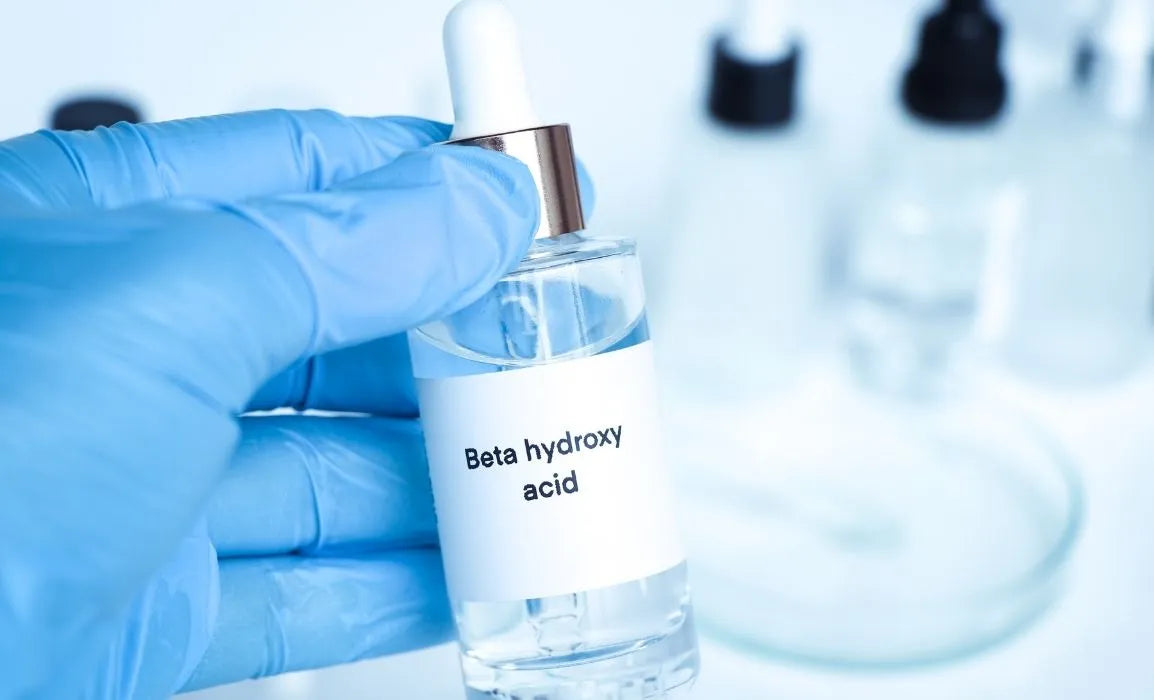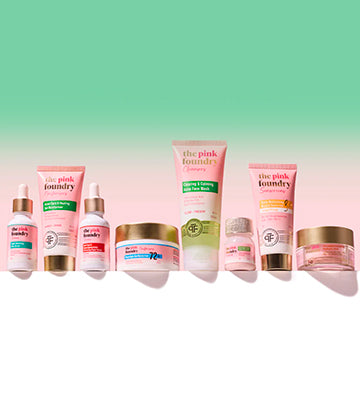BHA in Skincare

Introduction
When it comes to applying acids on your skin, it might look scary from afar. But once you know everything about the acids used in skincare, you won't fear at all. The only trick is finding the right acid for your skin.
Do you know these acids were only accessible to a professional back in time? But now you can see them in most of the bathrooms - of course, in lower dosages. The best part? These acids are a highly effective solution to your most common skincare trouble. Acne, pigmentation, or uneven skin tone, name it and you have a BHA to counter it. Do you know what is BHA? If not, we'll help you in understanding it.
What is BHA?
BHA stands for beta hydroxy acid. It works its magic by diving deep into your skin. Once it penetrates your skin, it gets rid of all the gunk that's causing trouble – you know, dead skin cells and excess oil. And voila! Your skin feels smoother, looks brighter, and those blemishes? They are out of the way.
But hey, BHA isn't just for acne-prone skin people. It's like the all-rounder of skincare. It's very versatile yet highly effective. It can help with fine lines, uneven skin tone, and even those annoying zits.
What are the different types of BHA?
Here are the two most common types of BHA used in skincare.
- Salicylic Acid: It is the unsung hero of skincare! Salicylic acid breaks down those tough skin layers. It removes all the dirt, oil, and dead skin cells. It's also a pro in dealing with other skincare woes like blackheads, whiteheads, and acne. Plus, it has anti-inflammatory powers, so it's great for reducing redness and irritation.
- Beta Hydroxybutanoic Acid : It is also known as Betaine Salicylate. A cognate of salicylic acid – it is all about keeping things gentle. This one is milder and less irritating than salicylic acid which is good for people with sensitive skin.
Some other BHAs are – Tropic acid and Trethocanic acid. With so many options to choose from, you may find it difficulty looking for the perfect BHA match for your skincare needs. Trust your dermatologist in this case.
How do BHAs work?
A BHA works on the uppermost layer of your skin's surface. It clears up all those unpleasant whiteheads, blackheads. Additionally, it has got antibacterial and anti-inflammatory properties. It goes deep into the skin and exfoliate pore lining. BHAs are particularly suitable for people who have normal to oily skin.
The exfoliating effect of BHAs also helps with common skin issues like hyperpigmentation. It helps you with reducing sunspots and post-acne marks over a period. Moreover, BHAs can also reduce the oil-production of skin.
What are the benefits of BHA in skincare?
BHAs brighten the skin and fight acne by exfoliating dead skin cells and unclogging pores. Here are its benefits in detail:
- Exfoliation: BHA effectively removes dead skin cells, preventing clogged pores and breakouts.
- Acne-Fighting: Its anti-inflammatory properties make it a go-to for treating all kinds of acne and preventing future flare-ups.
- Anti-Ageing: By promoting cell turnover, BHA can help reduce the appearance of fine lines and wrinkles.
- Brightening: BHA can help fade dark spots and hyperpigmentation, revealing a more even complexion.
- Keratolytic Action:BHA breaks down and soften keratin, a protein that causes skin cells to clump together. This action gives you that glowing and smooth skin.
- Skin Texture Improvement:Regular use of BHA can result in a smoother and more even skin texture.
- Sun Damage and Hyperpigmentation:BHA can aid in reducing the appearance of sunspots and uneven skin tone.
What precautions to take while using BHA?
It's crucial to use BHA the right way because of its harmful side effects. Here are some precautions you should take:
- Start Slow: Take your first step very slow. Then introduce BHA into your skincare routine gradually. This will prevent you from bad irritation and over-exfoliation of the skin.
- Use Sunscreen: BHA is known to make skin more sun sensitive. So, you should never forget to put on your sunscreen.
Also read: What is a brad spectrum sunscreen – and why you need one
- Avoid Mixing with Certain Ingredients: Never combine a BHA-infused product with other exfoliating acids or retinol. This may cause irritation.
How to use BHA?
Follow these steps to nail your skincare routine:
- Prep Your Skin: Begin with a gentle cleanser. Get rid of all the dirt and grime.
- Apply BHA: Next up, it's BHA time! Apply a small amount of your BHA product to those trouble spots. Let it work its magic for a few minutes.
- Continue with Your Routine: Once you have got the BHA benefits, you can continue your skincare routine as usual.
Conclusion
BHA is a game-changer in skincare. Now that you know the BHA meaning, you can confidently add it to your routine. Whether you're looking to get rid of the pecky-pimples, want a brighter looking skin, or reduce the signs of aging, BHA might just be your go-to to get best skin yet.

